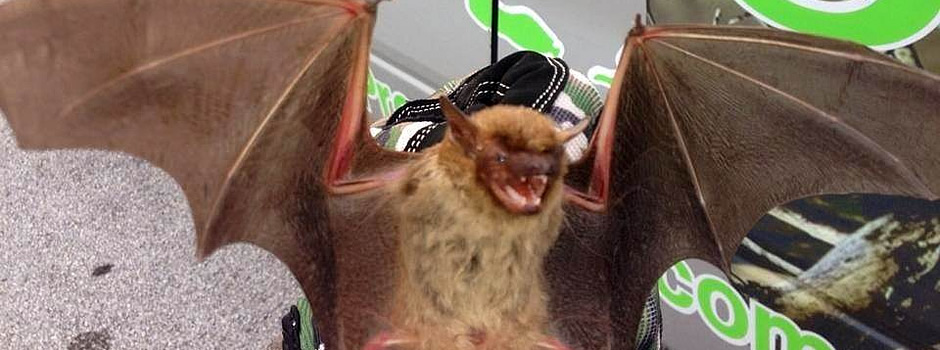Bat Removal Charleston & Mount Pleasant
Animal Pros ~ 843-790-4077
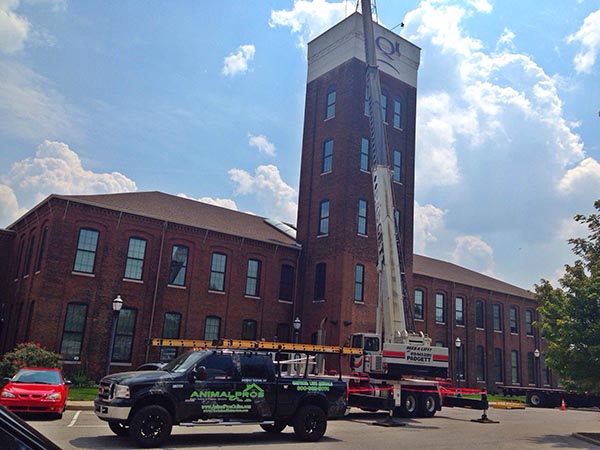 Animal Pros in greater Charleston and Mount Pleasant, South Carolina is the leading company for bat removal in a attic or commercial bat removal services. When Bats decide to move into your home or business, they can create unsanitary conditions. They can be a Health and Safety issue especially when bats are in the interior. Not all situations are bad though. Bats are vital to our environment. They can consume several hundred bugs and mosquitoes in a single hour. Bat Guano is used commercially and is highly regarded as a fertilizer. But when Bats have taken residence in a attic, there is no good situation.
Animal Pros in greater Charleston and Mount Pleasant, South Carolina is the leading company for bat removal in a attic or commercial bat removal services. When Bats decide to move into your home or business, they can create unsanitary conditions. They can be a Health and Safety issue especially when bats are in the interior. Not all situations are bad though. Bats are vital to our environment. They can consume several hundred bugs and mosquitoes in a single hour. Bat Guano is used commercially and is highly regarded as a fertilizer. But when Bats have taken residence in a attic, there is no good situation.
Animal Pros offers residential and commercial bat removal services in Charleston and Mount Pleasant area wide. We are fully licensed and insured with years of experience, work hand in hand with state wildlife agencies, and are multi state bat compliant certified with the National Wildlife Control Operators Association (NWCOA). Our bat removal step-by-step solutions will effectively solve bat problems permanently.
- On-site evaluation.
- Humane, Poison free, exclusion and removal solutions.
- Complete exterior seal-up of the residential or commercial structures.
- Decontamination of affected areas.
- Guaranteed specialized work, with a warranty.
- We specialize in bats and other wildlife.
Animal Pros provides humane bat removal and exclusion techniques to Charleston, Mount Pleasant, Isle Of Palms, Summerville, Folly Beach, James Island, Johns Island, West Ashley, Goose Creek, Kiawah Island, Seabrook Island, North Charleston, Ladson, Dewees Island, Folly Island, and Hanahan.
The following are some of the bat nuisance concerns you may have:
- Bat Species In Charleston
- Bats In The Attic
- Bats In The House
- Bats In The Soffit
- Bats In The Wall
- Bats In A Gable Vent
- Bats In A Dormer
- Bats Behind Shutters
- Bats In A Cabin
- Bats Under Barrel Tiles
- Bats In The Peak Of Tin Roof
- Bats In A Attic Vent
- Bat Sick or Rabid
- Bat In The Interior
- Bats In The Insulation
- Bats In The Basement
- Bats Hanging on A Home
- Bat Exclusion
- Bat Guano Removal
- Bat Droppings By Door
- Bat Droppings In Attic Covering Insulation
- Bats Left, Need Clean Up Of Droppings
- Bat Droppings On A Porch
- Commercial Bat Removal Company
- Bats In The Chimney
- Odor From Bat Droppings
- Drywall Damage From Bat Droppings
- Had Bats In The Attic, Now Notice Bugs
Human expansion and destruction of habitat have resulted in bats seeking alternative roost sites like roof voids (as small as 3/8 inch), attics, towers, chimneys, buildings, and barns.
According to the Health Department, if a bat is is in your home, there is evidence that it is possible for the bat rabies virus to infect victims purely through airborne transmission, even if there was no direct contact with the bat. The biggest problems with the bats comes from their droppings (or guano), diseases, and parasites.
Bats In The Attic Charleston
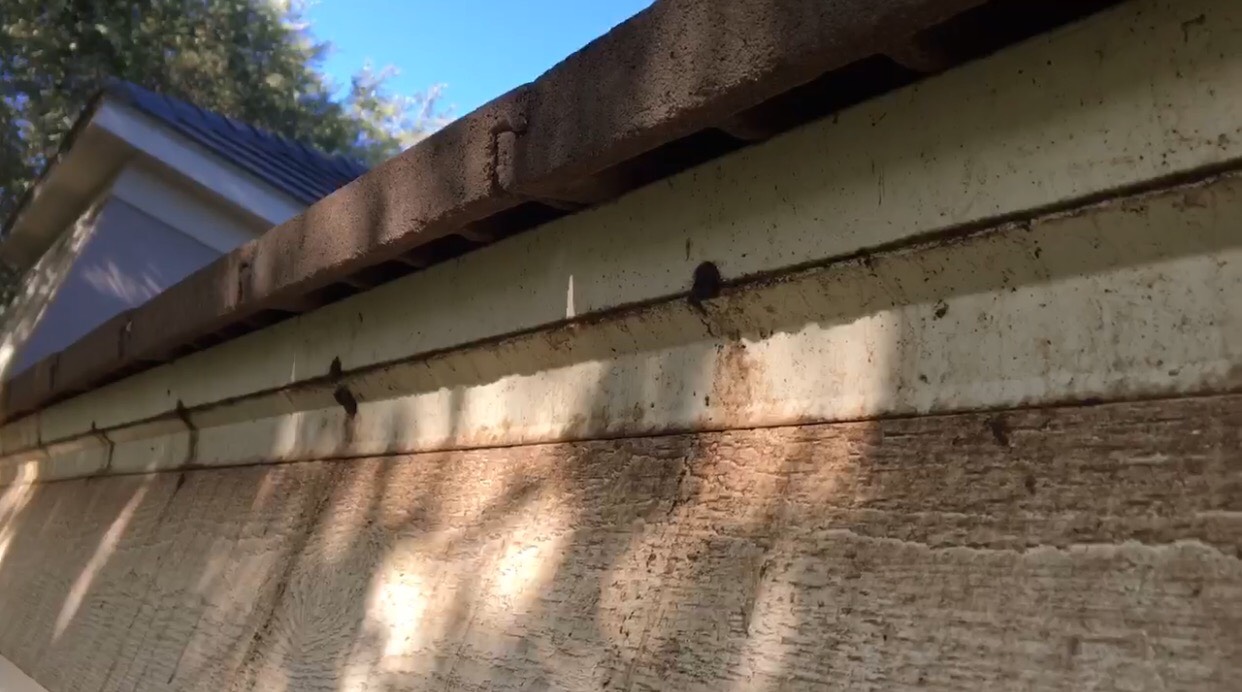 Animal Pros is the leading bat removal company in greater Charleston and Mount Pleasant, South Carolina. We not only humanely exclude the bats, but also clean up any contaminates, parasites, and repairing any openings to provide a long lasting solution. We can even work with your homeowner’s insurance to take care of any costs. We can help you to remove bats in the attic in Charleston. We use humane bat exclusion practices to allow bats to exit the structure, but not allow re-entry. Call us today for your bat control needs.
Animal Pros is the leading bat removal company in greater Charleston and Mount Pleasant, South Carolina. We not only humanely exclude the bats, but also clean up any contaminates, parasites, and repairing any openings to provide a long lasting solution. We can even work with your homeowner’s insurance to take care of any costs. We can help you to remove bats in the attic in Charleston. We use humane bat exclusion practices to allow bats to exit the structure, but not allow re-entry. Call us today for your bat control needs.
Do not try to attempt to remove bats on your own, as some species may be state protected. Do not touch any bats or disturb the droppings (guano), as it is a serious hazard. Bats are the number one carrier of rabies. Most of the nuisance bat complaints we receive include:
- Bats In The Attic
- Bats In The Soffit
- Bats In a Window Dormer
- Bats In The Gutter
- Bats In The Roof Peak or Ridge Cap
- Bats In a Gable Vent
- Bats In The Roofline
- Bats In The “Living Quarters”
- Bats In The Chimney
Charleston Bat Removal Company
Our professionals at Animal Pros will control your bat problems humanely. Bats have long adapted to living in attics and chimneys. Droppings on the outside of your home are usually a sign that you have a bat problem. Aside from bats being a nuisance, they do carry a number of diseases and parasites and bat control should only be attempted by a professional. Animal Pros is the leading bat removal company in greater Charleston, South Carolina. Contact a Animal Pros specialist today.
When Is Bat Maternity Season?
How To Prevent Bats – Bat Proofing
Bat proofing a structure to prevent bats from entering your home, attic, or building, is relatively easy. Close up or repair all possible or potential openings. Bats can get into the smallest openings as small as 3/8″, so keep that in mind. Being proactive and addressing openings before they happen to be used by a bat is key, especially if you have bats in your area. Most openings can be easily determined, but there are openings that are not easily seen, which is why it is best to hire a professional.
What Do Bat Droppings Look Like?
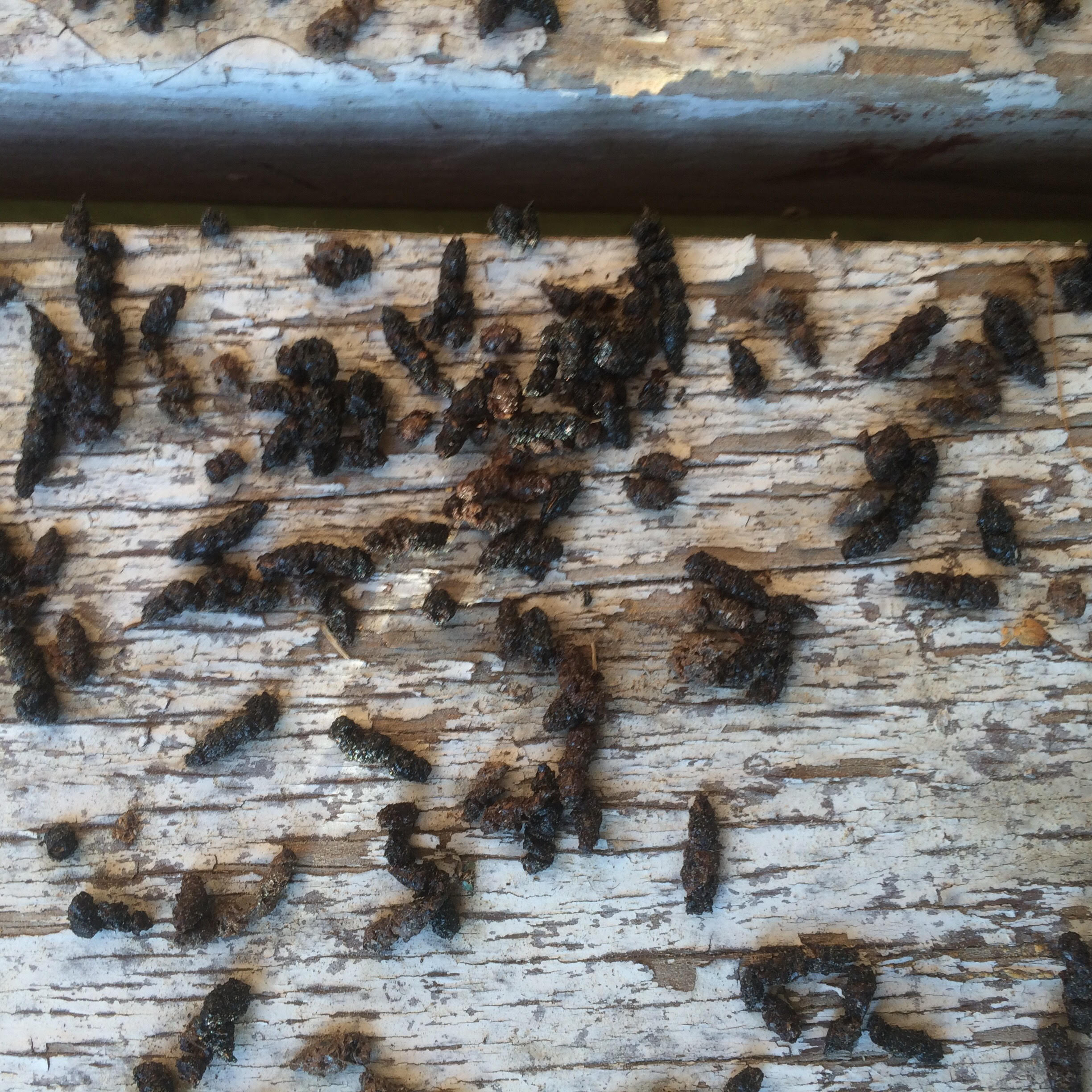 Bat Droppings happen to be one of the most mis-identified droppings found in or around someones home. Bat poop or guano, is a dark blackish-brown dropping larger than the size of a mouse dropping. Bat guano is a little larger than a grain of rice, by length and circumference. Bat droppings will often have a crystallized or shiny appearance due to the many insect parts in the droppings. Bat guano accumulations will often be found where a colony of bats roost, or where the colony of bats travel in and out of the structure. If a bat can consume hundreds of insects nightly, you can easily imagine how many droppings can come from a colony of bats in just one night.
Bat Droppings happen to be one of the most mis-identified droppings found in or around someones home. Bat poop or guano, is a dark blackish-brown dropping larger than the size of a mouse dropping. Bat guano is a little larger than a grain of rice, by length and circumference. Bat droppings will often have a crystallized or shiny appearance due to the many insect parts in the droppings. Bat guano accumulations will often be found where a colony of bats roost, or where the colony of bats travel in and out of the structure. If a bat can consume hundreds of insects nightly, you can easily imagine how many droppings can come from a colony of bats in just one night.
Bat Diseases
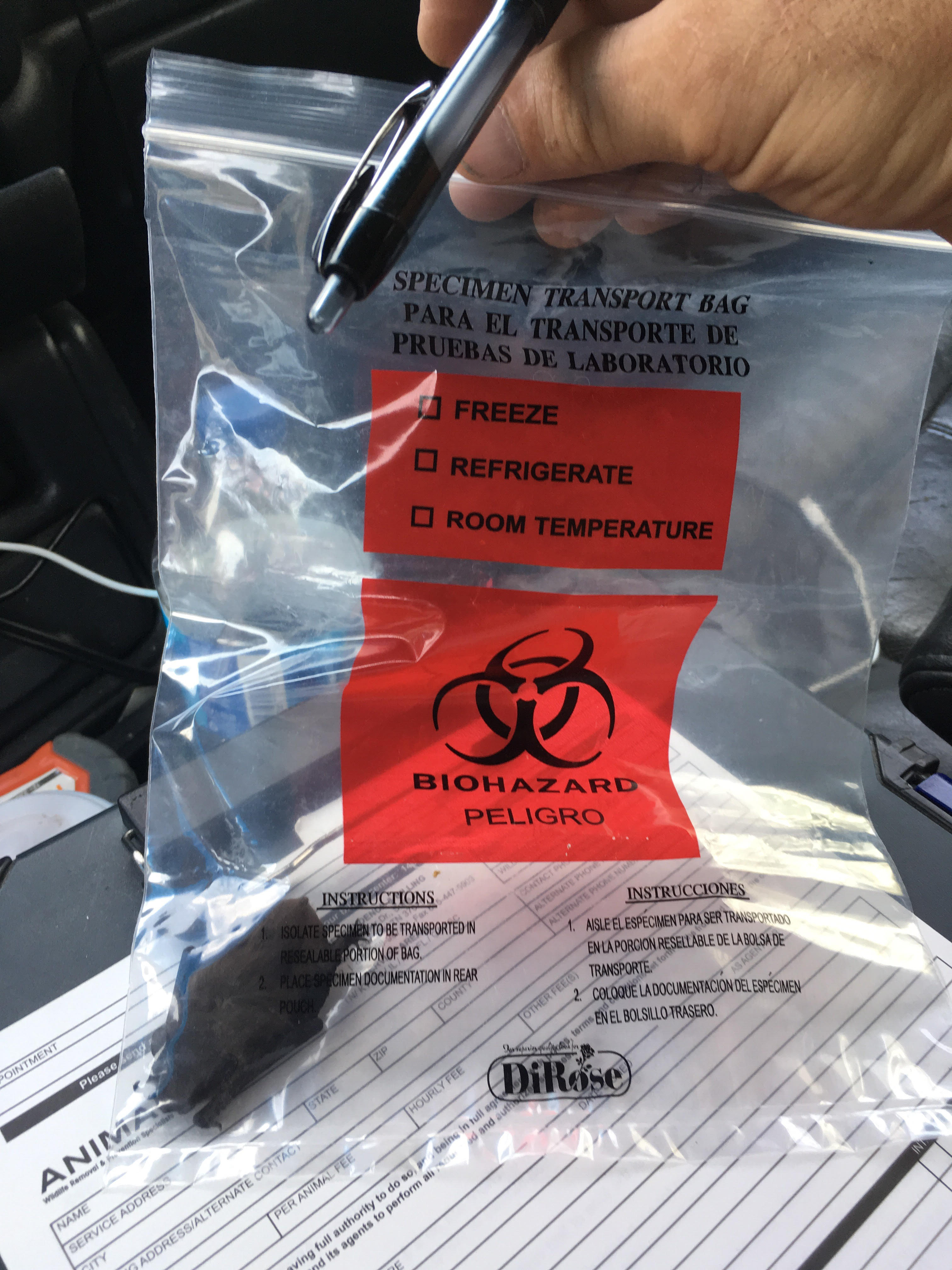 Bats and bat droppings can harbor over 60 human communicable diseases, which is why it is extremely important to “bat proof” your home or structure. Bat colonies can produce the quickest amount of fecal accumulation of any animal, even though remarkably small in size. In a attic, it can be bad news if droppings covers insulation and duct lines. Bat Droppings in a enclosed, limited air space, like a attic, do not breakdown naturally as if outside exposed to the elements, and can harbor virus, pathogens, bacteria, fungus, and disease. Histoplasmosis, fungus that grows on bat droppings is one of the top concerns. As droppings dry, disturbance to droppings from the bats moving over droppings, or someone walking over droppings can circulate particulates becoming airborne. People and pets can be at risk of getting histoplasmosis. Rabies is the other disease that should be a concern, and according to the Health Department, they suggest, if you are in the same room with a bat, you need to get checked-out or pre-rabies shots, and Centers for Disease Control suggests, if scratch or bite occurs, to seek medical attention immediately. Presence of ectoparasites in bats can be of a concern. The most noticeable ectoparasites in bats, are the bat bugs, mites, ticks, fleas, and flies. The presence of ectoparasites can usually be seen once the hosts or bats are removed, and the ectoparisite searches for a new host. Common bat diseases that can be transmission able to humans include:
Bats and bat droppings can harbor over 60 human communicable diseases, which is why it is extremely important to “bat proof” your home or structure. Bat colonies can produce the quickest amount of fecal accumulation of any animal, even though remarkably small in size. In a attic, it can be bad news if droppings covers insulation and duct lines. Bat Droppings in a enclosed, limited air space, like a attic, do not breakdown naturally as if outside exposed to the elements, and can harbor virus, pathogens, bacteria, fungus, and disease. Histoplasmosis, fungus that grows on bat droppings is one of the top concerns. As droppings dry, disturbance to droppings from the bats moving over droppings, or someone walking over droppings can circulate particulates becoming airborne. People and pets can be at risk of getting histoplasmosis. Rabies is the other disease that should be a concern, and according to the Health Department, they suggest, if you are in the same room with a bat, you need to get checked-out or pre-rabies shots, and Centers for Disease Control suggests, if scratch or bite occurs, to seek medical attention immediately. Presence of ectoparasites in bats can be of a concern. The most noticeable ectoparasites in bats, are the bat bugs, mites, ticks, fleas, and flies. The presence of ectoparasites can usually be seen once the hosts or bats are removed, and the ectoparisite searches for a new host. Common bat diseases that can be transmission able to humans include:
- Rabies
- Histoplasmosis
- Hantaviruses
- Leptospirosis
- Cryptococcosis
- Ebola (Foreign)
- Psittacosis
- Other Bat-Borne Viruses
How Do I Get Rid Of Bats
Getting rid of bats can be challenging for someone untrained, which can easily make the problem much worse. Successfully removing a Bat Colony should be done by exclusion of the bats, a process that allows them to fly out but not fly back in, only after every possible and potential secondary openings are permanently sealed off. Bats should never be trapped or poisoned as they can be state protected. Bats should not be disturbed or removed during pup season, when they give birth. This can range in time depending on geographical are and species of bats, but usually mid April – mid August. Removal of Bats should not be the only concern, as droppings will need to be removed as well. Follow these steps to aid in removal of bats from a building or structure.
- Perform a inspection of the building by trying to identify the location of the bats, openings they are entering, and a survey of damage. Bat Watches performed right before dark can allow you to visibly see where bats are exiting, as the drop from their roosting area.
- Perform a attic inspection, paying special attention to time of the year and species of bats, damage in your attic, or fecal accumulation areas. Bats should not be disturbed during certain times. Professional help is recommended.
- Repair and seal all secondary openings, leaving the main and problem opening undisturbed. This is a important step as if anything is missed as bats are excluded, they will have a opening to re enter. It is also important not to disturb the primary areas as it could cause the bat colony to split or move to another part of the home.
- Exclusion of the bats, or installation of excluders on primary openings to allow bats to fly out, but not fly back into the structure. This is recommended by a professional only, and can end in disaster if the bats are trapped in, or using improper excluders.
- Removal of Fecal Accumulation or Guano from attic, walls, soffit, roof, or ground. Before removing, disinfecting and deodorizing is recommended, and using a professional is suggested.
- A follow up Bat Watch to ensure no bats are present or roosting on the outside, entering, or exiting, and that the home is secured.
Contact one of Animal Pros’s state certified professionals to handle your bat problems. Government agencies, property managers, businesses, and thousands of homeowners have relied on Animal Pros, so should you.
We were hearing noises in our attic, and used a pest control company to remove the animals making noise. They placed out glue boards in the attic, and said we had mice, but now we are finding bats on the glue boards. What should we do now?
Sounds like your Bat problem was misdiagnosed. It is important when hiring a wildlife service to only hire a service that specifically deals with wildlife, as opposed to a pest control company that primarily deals with bugs. Not all wildlife companies are properly trained on with Bats, and we would recommend only using NWCOA Certified Bat Compliance operators. I would have the pest company retrieve their glue boards, and ask for a refund. I would then hire a professional certified company to resolve the Bat problem. You can contact us 24 hours a day.
Bats are roosting behind my shutters. Is there anything that can be done?
Yes, this is a common problem, and requires special attention. Anything short of completely sealing all shutter access, and it can be a continual problem. Opening shutters in most cases will allow bats to choose a different roost site. The openings on shutters that will need to be addressed is the louver openings, and the openings around the back of the shutters. Louver openings can be screened and the screen painted to match, making it aethetically pleasing and preventing any access. Openings around the back of the shutters can be repaired by either making the shutters flush mount, or by building shutter boxes of wood, completely closing off openings. Those too can be painted, making the repair aesthetically pleasing, and is a affordable process.
We have noticed Bats in our attic, and have Bed Bugs too. Could the two problems be related?
Yes, these two problems are related, but chances are you have Bat Bugs instead of Bed Bugs. Bat Bugs are a ectoparasite that be found on Bats, in guano, areas where there has been bat colonies, or around roosting areas where bats congregate. They look exactly like bed bugs, and only the trained eye can distinguish the two. Infestations can be very minor to very major problems. Once Bats are removed or happen to take up a roost elsewhere, ectoparasites like bat bugs can start searching throughout the home for a new host. If you notice activity like this call one of our specialists immediately.

